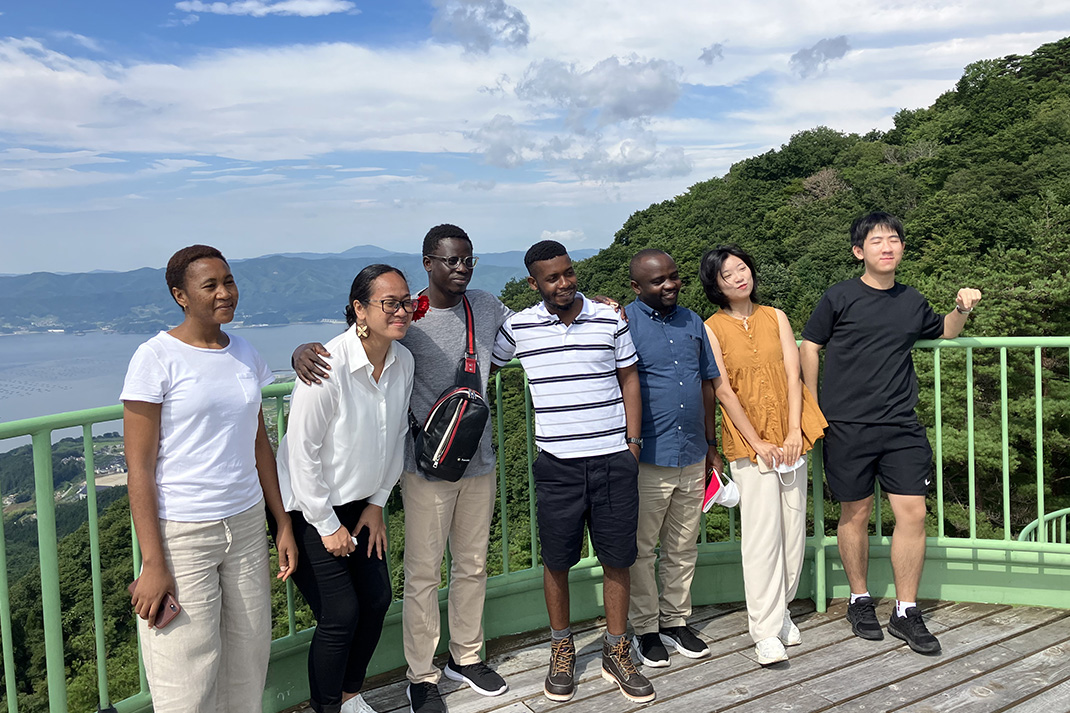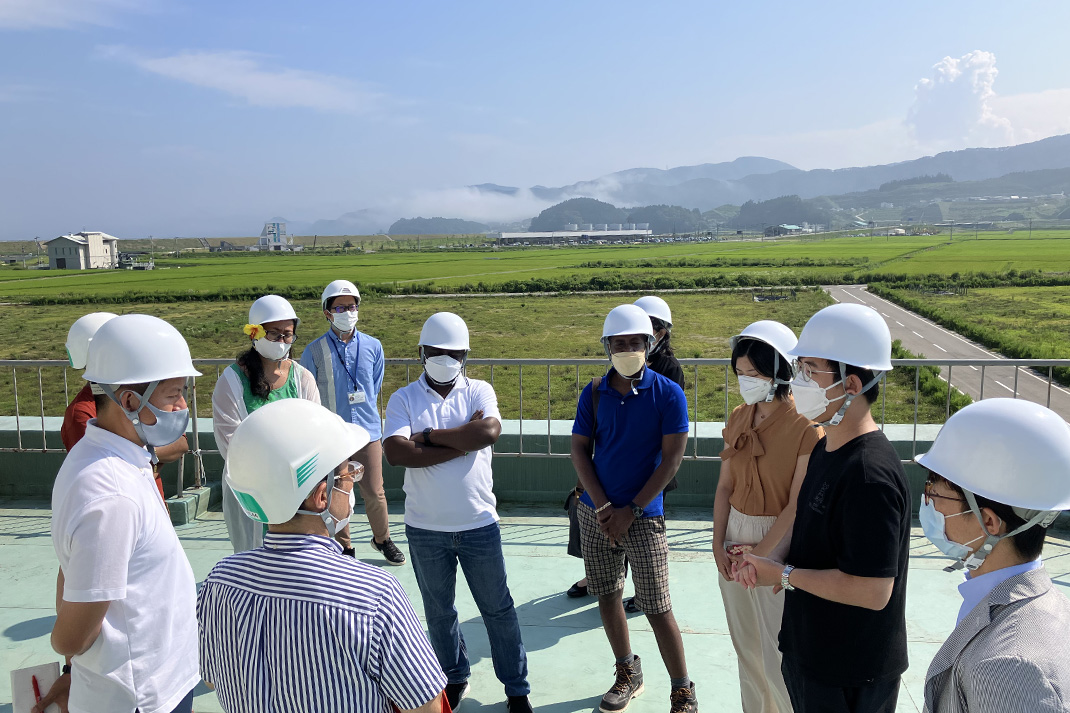Rikuzentakata Field Trip
Master of Social Development and Administration Course (MSDA)
Jun 28, 2023
OVERVIEW
The MSDA course offers a field trip to Rikuzentakata City for first-year students as part of their off-campus research activities. This is intended not only to observe disaster countermeasures, but also to deepen exchanges with other students and faculty members. Students from other countries enjoy the culture of life in Japan. This is an enriching opportunity for them to deepen the meaning of studying at a Japanese university.
MSDA Field Trip (2022.8/7-8/9)


ZHAOWenxi

Before the field trip, we already had a general idea of Rikuzentakata in the orientation, a typical coastal city destroyed by the massive tsunami caused by the Great East Japan Earthquake in 2011. But these are all words. If you don't go to this city, you cannot understand the devastation that the tsunami caused to the city, to the people, and to the country. This trip gave us the opportunity to get out of school and out of Tokyo to go there and see for ourselves what natural disasters can do to us.
During this field trip, the school organized a visit to the museum built in memory of the people who lost their lives in the tsunami, met the miracle of a pine tree which is a symbol of hope and inspire after the tsunami, climbed to the top of the building to experience the highest height of the tsunami, studied how to better protect ourselves in the crisis comes, and also met after the citizens which still revive hopes to their life.
I am glad I participated in this event, it made me realize how small we humans are in front of the nature, the only thing we can do is to arm ourselves before the danger comes, whether it is knowledge or equipment. If you are interested in the post-disaster reconstruction or not familiar with the tsunami, I am strongly recommended you to visit this city, I am sure you will gain a lot. In addition to that, there are also very friendly minpaku here, where you can feel at home and make a good memory here.
LIN Yuan

Rikuzentakata was once a peaceful seaside city but was destroyed in the 2011 Tohoku earthquake and tsunami. At a beach there called Takata-Matsubara, the pine grove the local people were proud of was ruined by the tsunami in one piece, leaving only one pine tree towering, known as the miracle pine tree today. The miracle pine tree indicates the tenacity and perseverance of life.
The good news is that the Takata-Matsubara is being replanted and will be lush again soon. What's more, those who lost their families, friends, and houses in 2011 gradually get through the grief. It could be said that, in Rikuzentakata, I witnessed the local people's courage and determination to rebuild their life.
It's hard to forget the Kamimura family, who hosted us. They were very hostile and prepared a wonderful dinner for our arrival. What's funny is that as a newbie in Japanese, I was the interpreter between the host family and three other friends; challenging but exciting. Besides, I will never forget the night I spent in a Japanese-style tatami room, especially with the "snore brothers.
It's hard to forget the Nagahora AKB who spent the whole morning preparing lunch for us, the warm-hearted entrepreneur who interpreted Japanese to English for us for two days, and the volunteer presenter who unfortunately lost his beloved ones in the tsunami. The shocking figures displayed in the museum keep echoing in my mind.
It's hard to forget the efforts of Prof. Kuramoto, Prof. Nakano, and Mr. Otake, who worked hard to bring us a fantastic learning journey. I want to thank them for taking care of us and explaining to us in detail during the three days. Furthermore, I want to thank MSDA and Rikkyo University for providing us with this precious opportunity, which I benefited greatly from and will remember in my heart forever!
SANYANG Shola Mahoney

Upon arrival, we visited several places before we were finally received by our hosts. One unforgettable moment was the sumptuous food we had which was prepared by the hosts. It was a remarkable evening as we had an exciting interaction with them. Moreover, the joyous mood accelerated when we climbed the mountains. One of them used to be a castle during the medieval era. It is covered with pine trees just like the other mountains. Another one we climbed gave us a good view of the area. I could see the peninsula vividly and the river which flowed from the mountains to the Pacific.
Despite the unforgettable joyful experience we had, we saw relics reminiscent of a sad memory of an event that not only shocked Japan but the world at large! We visited the memorial museum built in honor of the victims of the 2011 earthquake that was followed by a tsunami that claimed thousands of lives. The survivors recounted how their loved ones died when the flood reached a height of about 12 meters submerging almost all the buildings that were on low land. It was very sorrowful but the people informed us that recounting this event always makes them remember their loved ones who had died in the disaster.
In the midst of the joy and melancholy, there are lessons that I have learned from this excursion. Despite the hardship the people faced in the aftermath of the disaster, they did not give up. They instead became more united and resolute. They built back their communities better than they used to be. They were able to invigorate the local economy and strengthen community cooperation. Kudos to the people of Rikuzentakata!!!
My sincere gratitude to Rikkyo University and the people of Rikuzentakata for making our trip a success!!!
MACANGIRA Abdul

Among others, one of the unforgettable and remarkable moments was the "Minpaku" time, when after visiting Tsunami Memorial Museum and Kasen Junior High School, which was completely destroyed by tsunami we were hosted by a very wonderful family, where we spent our first night and we had a delicious food and excited conversation with the hosts. Furthermore, I cannot forget the wise advice given by the hosts. Indeed, the most striking and remarkable advice was that we should take advantage of the opportunity and when we go back home, we have to think collectively, not individually, so that we can develop our countries.
However, as I mentioned before, throughout our trip we visited Tsunami Memorial Museum that was built in honor of the victims of tsunami occurred in 2011, which killed thousands of people. So, despite of unforgettable moments we experienced, it was also so shocked experience, hearing people who lost everything including their loved families recounting the sad moments.
In short, I can say that despite of joyfulness and anguish I have learned two lessons from the trip. The first lesson was the determination of Rikuzentakata people, particularly Kasen Junior High School students, who 80 percent of them lost their homes, parents and even their school. However, they were able to move forward.
The second lesson I have learned is that, whenever disaster occurs try to do your best, do not make assumptions and lead others in evacuation.
Well there are the people of Rikuzentakata!
BAKANIBONA Sinai

All in all, I was profoundly moved by Tsunami memorial and also inspired by the resilience of the survivors and remarkable progress of Rikuzentakata village. People are believing in reconstruction of their village by respecting the evacuation norms. Community Service and solidarity can also be another solution to people who have faced different problems. I have learnt that the human solidarity is paramount motivation to sustain people who are in cumbersome situations. It strengthens them and it also helps them to feel that they are not alone.
RICHTER Vironica Nangula

On 7th of August 2022, 7 students with 2 lecturers and one staff member from the MSDA department of Rikkyo University, Ikebukuro campus undertook a field trip to the city of Rikuzentakata which is located in Iwate Prefecture. The aim was to learn and experience the disaster risk management system in place and the countryside living of Japan.
Field Observation
The 2011 Tohoku earthquake and tsunami also known as the “Great East Japan Earthquake” caused extensive damage to the city of Rikuzentakata. The first stop of the field visit was at the Iwate Tsunami Memorial Museum which is dedicated to preserving the devastating events of the Tohoku earthquake and tsunami and communicating the importance of disaster mitigation in building a resilient society, we were taken on a guided tour to some of the disaster remains such as the miracle pine tree, the former Rikuzen-takata Youth hostel and the Rikuzentakata City Kesen Junior High school buildings. After the guided tour of the Iwate Tsunami Memorial Museum, we got to experience Minpaku, an overnight homestay at a private home, a true Japanese home experience it was. On the second day of the field trip, we met at the Rikuzentakata Global campus and were taken through the temporary housing used as shelter for disaster affected community. We than got to experience a lecture by a representative from the local electricity supply company. We visited historical buildings and were taken through the events that unfolded on the 11 March 2011 by the survivor who lost his family on that tragic day plus the Yoshida-ke Residence Disaster Recovery Project. The last day of the field trip included site seeing, Disaster response and preparedness lesson by the Director General of Nagahora-genkimura and a disaster prevention experience game and lastly a delicious lunch with local fresh products by the local woman.
Conclusion
The efforts by the local government of Rikuzentakata, various stakeholders and the community post the Tohoku Earthquake and Tsunami in terms of mitigation, reconstruction and resilience building are highly applaudable and serves as lessons to not only other parts of Japan but the entire world. The highlights of the trip for me was the Shinkansen ride, seeing beautiful landscapes along the way, experiencing the countryside environment, scenery and locally produced food, plus the DRM lecture and the disaster prevention experience game by Mr. Seiji Murakami and the temporary housing facilities. I have learned so much during the field trips, thank you MSDA for the priceless experience and exposure.
LAUINA Victoria Tausiva

RECENT TOPICS
Oct 17, 2025
MSDA Rikuzentakata Field Trip 2025
Master of Social Development and Administration (MSDA) Course